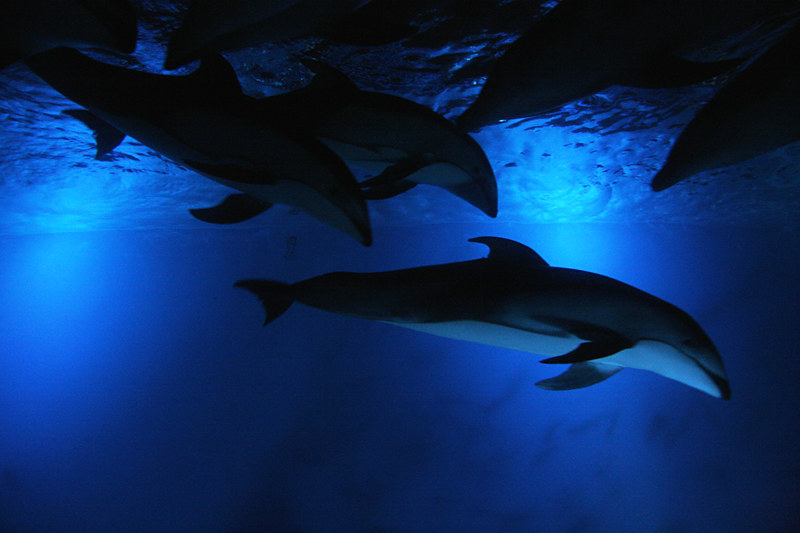Last updated on December 28th, 2023 at 03:59 pm

Do Dolphins Sleep At Night? Yes, dolphins sleep at night, but not in the same way humans do. Dolphins are fascinating marine mammals known for their intelligence and social behavior.
Many people are curious about whether and how dolphins sleep. Like other mammals, dolphins also sleep, although they do so in a different way than people do.
Dolphins typically only sleep with half of their brains active at a time, with the other half staying awake to support breathing and environmental awareness.
Dolphins’ special adaption enables them to respond to any threats or hold their place within a pod while simultaneously allowing them to relax and recover.
We’ll look into the fascinating ways that these amazing creatures sleep as well as the sleeping patterns of dolphins. [Do Dolphins Sleep At Night?]
Table of Contents
- 1 The Sleep Patterns Of Dolphins
- 2 Variations In Dolphin Sleep Patterns
- 3 The Nocturnal Habits Of Dolphins
- 4 Dolphin Nocturnal Behaviors
- 5 Factors Influencing Dolphin Nocturnal Activity
- 6 How Do Dolphins Sleep At Night?
- 7 The Benefits Of Dolphin Nocturnal Habits
- 8 The Role Of Sound In Dolphin Sleep
- 9 Frequently Asked Questions On Do Dolphins Sleep At Night?
- 10 Conclusion
The Sleep Patterns Of Dolphins
Dolphins are intriguing aquatic mammals distinguished by their intellect and cheerful disposition. Unlike humans and many other animals, dolphins have distinct sleep cycles.
Since they must deliberately breathe air from the surface, dolphins cannot go into a profound sleep, unlike humans.
Because of this, dolphins sleep in a state called unihemispheric sleep, in which they only use one half of their brains at a time to ensure breathing and stay aware of their environment, and the other half stays awake.
Dolphin sleep cycles can range anywhere from a few minutes to many hours and are usually composed of little bouts of slumber throughout the day and night.
These cycles change according to a number of variables, including location, age, and weather.
In addition, dolphins have the amazing capacity for partial slumber, during which they can shut one eye and remain aware of their surroundings.
See Also: Do Dolphins Sleep With Both Eyes Closed? Sleeping Beauties
Variations In Dolphin Sleep Patterns
Dolphins do sleep, it is crucial to remember, although their sleep habits are very different from ours.
Their sleeping patterns are influenced by a variety of factors, including the presence of predators, the necessity to surface for air, and the social dynamics within their pod. [Do Dolphins Sleep At Night?]
Dolphins have also been seen performing actions like “catnapping,” which is when they close their eyes for a short while and snooze while still being partially aware of their surroundings.
In summary, dolphins’ sleep habits represent a special adaptation to their aquatic surroundings and physiological requirements.
Gaining knowledge about these patterns will help you better understand their behavior, thought processes, and general wellbeing.
The Nocturnal Habits Of Dolphins
Dolphins, who are renowned for their playfulness and intelligence, have unusual sleeping habits. Although they don’t sleep like us, dolphins do sleep, despite popular assumptions.
They are classified as polyphasic sleepers, which means that instead of sleeping through the night for an extended length of time, they sleep in brief bursts.
This is because a number of things affect how active they are at night. [Do Dolphins Sleep At Night?]
See Also: Do Dolphins Sleep With Half Their Brain? Discover the Truth!
Dolphin Nocturnal Behaviors
During their nocturnal periods, dolphins display distinct activities. They might swim slowly or float on the surface to conserve energy when they’re sleeping.
They are able to keep a close eye out for predators and other possible threats because of this activity.
Dolphins also exhibit unihemispheric sleep, which is characterized by the activity of one half of the brain sleeping at a time while the other half is awake. [Do Dolphins Sleep At Night?]

Factors Influencing Dolphin Nocturnal Activity
| Factor | Description |
| Food Availability | Since dolphins are opportunistic eaters, the availability of food has a big impact on when they go nocturnal. They might modify their sleeping schedules to align with times when the abundance of prey is at its peak. |
| Predator Avoidance | Dolphins are prey animals, therefore they must be vigilant and steer clear of predators. In situations where there is a greater chance of predation, they have been reported to become more active at night. |
| Environmental Factors | Dolphin sleep habits can also be impacted by environmental variables as noise levels, currents, and water temperature. These environmental conditions may cause them to change their nighttime habits. |
In conclusion, a variety of causes have shaped the distinct sleep patterns of dolphins.
Their adaptable sleep cycles enable them to survive and flourish in their aquatic environments, which are facilitated by their nighttime activities and the constantly shifting environment they live in. [Do Dolphins Sleep At Night?]
How Do Dolphins Sleep At Night?
Dolphins have developed amazing underwater sleeping adaptations. Among the most fascinating ideas is that they can sleep in unihemispheric slumber.
Because only one hemisphere of their brains sleeps at a time, they are still able to swim and perform other necessary tasks while they are at rest.
Dolphins have evolved special systems that enable this kind of slumber. [Do Dolphins Sleep At Night?]
Their method of “synchronous swimming” involves them swimming in close formation as a group, with each member taking turns to surface and breathe while the others watch over the sleeping members.
Dolphins can relax thanks to this cooperative behavior, which also reduces the dangers of deep slumber. Their auditory system is thought to have a major factor in this as well, enabling them to remain awake even when they are sleeping.
Dolphins have developed amazing underwater sleeping adaptations. Among the most fascinating ideas is that they can sleep in unihemispheric slumber.
Because only one hemisphere of their brains sleeps at a time, they are still able to swim and perform other necessary tasks while they are at rest.
Dolphins are able to sleep like this because they have developed unique systems. [Do Dolphins Sleep At Night?]
Their “synchronous swimming” technique entails them swimming in close formation together as a group, with each member taking turns breathing and coming to the surface while the others keep an eye on the members who are asleep.
This cooperative behavior helps dolphins unwind and lessens the risks associated with deep sleep. They are also believed to be able to stay alert throughout sleep thanks in large part to their auditory system.
See Also: Where Do Dolphins Sleep? What Do Dolphins Do At Night?
The Benefits Of Dolphin Nocturnal Habits
Dolphins’ nighttime lifestyle has many advantages. The enhanced foraging chances throughout the night is one benefit.
Because they are expert hunters, dolphins hunt for food under the cover of darkness. Even in poor light, they can identify prey well thanks to their echolocation skills.
Another important benefit of dolphins napping at night is that they can avoid predators. Dolphins can lessen their likelihood of coming into contact with sharks and other predators by being active at night.
Dolphins have an advantage when it comes to avoiding any hazards since they are faster and more nimble in the water. [Do Dolphins Sleep At Night?]
The Role Of Sound In Dolphin Sleep
Do Dolphins Sleep At Night? Scientists have been researching the intriguing topic of sound’s influence on dolphin sleep for many years.
Researchers have concentrated on one component of dolphin sleep: echolocation.
Dolphins can detect items in their environment by using sound waves for navigation, a phenomenon known as echolocation.
Dolphins use echolocation while they sleep, although it’s thought that its use is less frequent and accurate than it is during the day.
Another fascinating field of research is dolphin communication when they sleep. [Do Dolphins Sleep At Night?]
Although it is well known that dolphins are extremely gregarious creatures and frequently sleep in groups, scientists are still attempting to figure out how dolphins converse with one another while they are dozing.
It is thought that while they are sleeping, dolphins communicate with one another using a variety of vocalizations, including clicks and whistles.
All things considered, the function of sound in dolphin sleep is an intricate and fascinating subject that is still being studied. Scientists can learn more about the sleep habits and behavior of dolphins by examining how they use sound while they sleep. [Do Dolphins Sleep At Night?]
See Also: Do Dolphins Sleep Underwater? Do Dolphins Sleep While Swimming?
Frequently Asked Questions On Do Dolphins Sleep At Night?
How Long Do Dolphins Sleep At Night?
Dolphins sleep about 8 hours, which is known as unihemispheric slow-wave sleep.
How Long Can Dolphins Stay Out Of Water?
Dolphins can only stay out of water for a short time because they are adapted to living in the ocean.
Do You See Dolphins At Night?
Yes, dolphins can be seen at night. They are known to be active during the day as well as at night. [Do Dolphins Sleep At Night?]
How Often Do Dolphins Come Up For Air When Sleeping?
Dolphins come up for air often while sleeping, typically every few minutes. They can sleep with one eye open to stay alert and keep breathing. This behavior helps them to rest and refresh themselves while still staying aware of their surroundings.
Conclusion
In conclusion, dolphins are amazing animals with distinct sleeping patterns.
They only sleep with one half of their brains asleep at a time, the other half being awake, a phenomenon known as unihemispheric sleep.
They can remain vigilant and thrive in their maritime habitat because of this.
Dolphins do sleep, but not in the same way as humans do. They are amazing and breathtaking creatures whose sleep habits are ideally adapted to their lives in the water.

Mr. Das, a certified pharmaceutical scientist, holds a Bachelor of Science in Pharmaceutical Sciences and passionately contributes to dolphin conservation as a member of the committee in Bangladesh.


